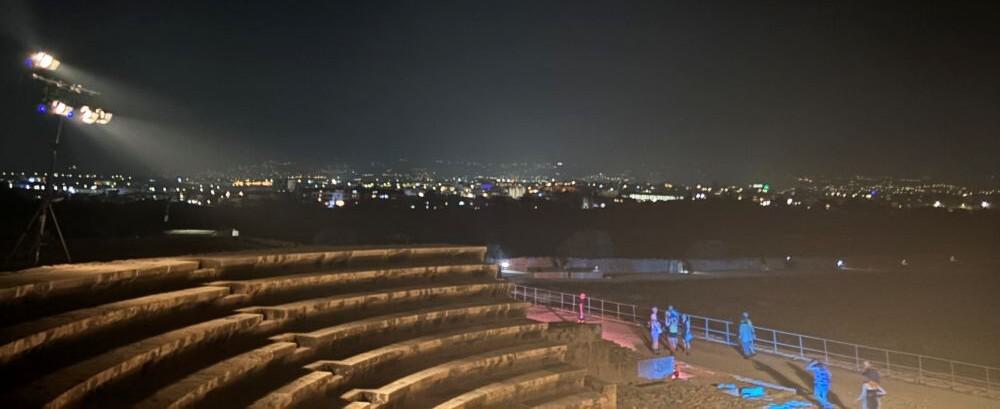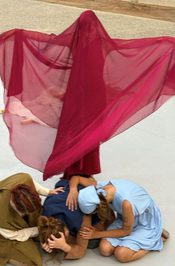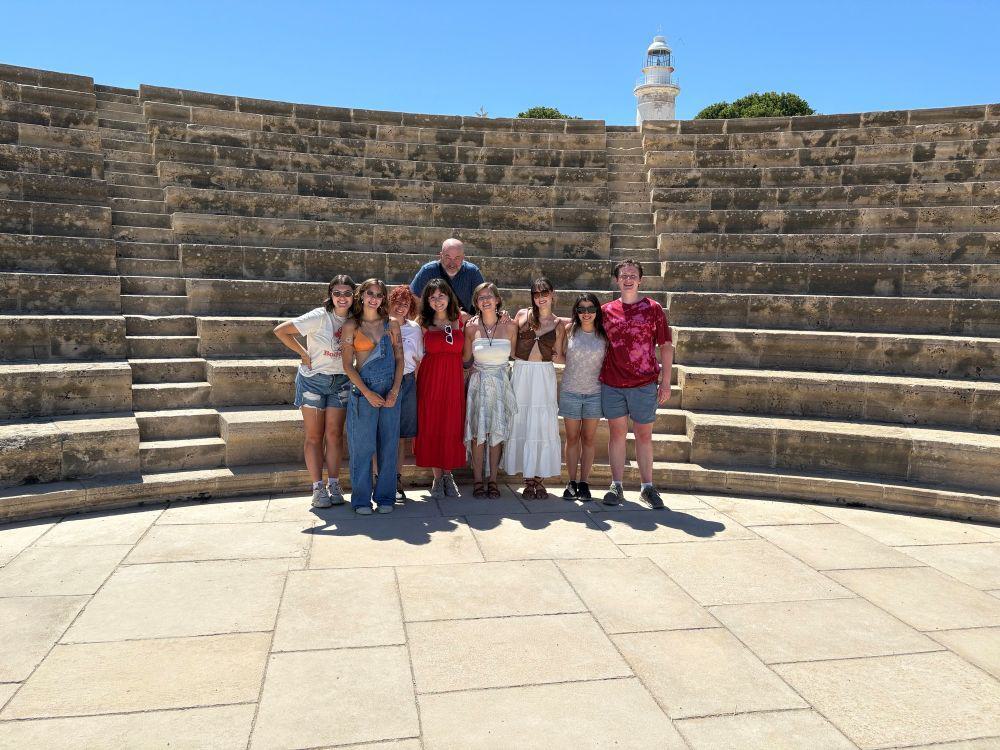The ancient stones of a second-century amphitheater in Cyprus echoed with the voices of │√╓¡╩╙╞╡ Theatre students this summer with a of ΓÇ£Elektra.ΓÇ¥
The staging at the Paphos Ancient Odeon could barely be more appropriate, as the venue was the kind of place the Greek tragedy by Sophocles was created for in the first place. For five intensive weeks, nine BFA acting majors were treated to an unparalleled immersive experience, bringing the play to life not far from the very cradle of its origin.
Led by Lance Marsh, head of performance and professor of acting, the group toured and performed in Cyprus, a Mediterranean island steeped in over 10,000 years of history.
The trip was a long-held dream for Marsh, one that was initially derailed by the COVID-19 pandemic in 2020. "It took us five years to get it back into the cycle where we could travel again," Marsh said.
Students primarily stayed at │√╓¡╩╙╞╡'s partner school, the University of Nicosia in the capital of Cyprus. During the week, they took two classes with Marsh, with a significant portion dedicated to building and rehearsing their production of ΓÇ£Elektra.ΓÇ¥
Immersive learning and ancient wonders
Maleah Minyard, a senior BFA acting major who played "Elektra III" (the role of Elektra was split into four parts for the production), had been saving for a study abroad program since her freshman year, anticipating a Mediterranean destination.
"To be surrounded by the history that was being referenced in our play was so ΓÇö I hate to sound ΓÇÿartsyΓÇÖ ΓÇö but it was really immersive and cool," Minyard said. She recounted seeing the Rock of Aphrodite and other historical landmarks that directly connected to the themes and references in their classical play.
Weekends offered a chance for broader exploration. Alongside approximately 60 other American university students studying various subjects like nursing and photography, the │√╓¡╩╙╞╡ group embarked on excursions across the island. They ventured into the mountainous regions, sampling local delicacies, visited picturesque beach towns, and explored a wealth of ancient archaeological sites.
Cyprus boasts a long and varied history, with evidence of Neolithic, ancient Egyptian, Greek, Roman, Venetian and Turkish civilizations. The students even saw a castle where Richard the Lionhearted was married.
A timeless stage

The culmination of their intensive work was two performances of ΓÇ£Elektra.ΓÇ¥ The first was held in the large outdoor amphitheater at the University of Nicosia. The second, and perhaps most memorable, took place in a remarkably preserved theater in the beach town of Paphos, originally built in the 4th century BC and later used by the Roman colony.
"We had over 200 people show up for the night of the performance,ΓÇ¥ Marsh recalled. ΓÇ£They gave the students massive standing ovations."
The nighttime performance, partly necessitated by Cyprus's summer heat and partly for dramatic lighting effect, began at 9 p.m. local time. The │√╓¡╩╙╞╡ team traveled with costumes designed by the School of Theatre's costume designer, and the University of Nicosia provided staffing assistance.
Marsh highlighted the unique educational value of performing in such a historic space.
"It was profoundly interesting to be able to work in a theater that you could really get a sense of stepping back in time," he said.
He emphasized how the experience allowed students to understand the history of the Greeks and how Greek mythology is woven into the island's culture.
"To get to perform a play that was written 2,500 years ago in a theater that was around basically from the same time period is pretty unique,ΓÇ¥ Marsh said.
Cultural immersion and global perspective

Beyond their own production, the │√╓¡╩╙╞╡ students attended two professional performances as part of an international Greek drama festival also taking place on the island. This exposure to how other companies, including Greek and Italian ones, interpret Greek tragedies provided invaluable insight. The extended five-week stay also allowed the students to truly immerse themselves in Cypriot culture.
"They were learning the city and they were learning the culture and they were forming relationships," Marsh said, emphasizing that longer study abroad programs offer a deeper understanding than shorter trips.
Minyard echoed this sentiment, noting that the preparation for the trip included meetings with both Marsh and the University of Nicosia, where they learned about Cyprus's history, and the importance of listening to local perspectives.
For Minyard, who traveled to Dublin and crossed through Europe before meeting the rest of the group in Cyprus, the trip also ignited a "travel bug."
"The expensive part is getting over there," she reasoned, "so I decided once I'm there I needed to see some other stuff."
This Cyprus experience is part of the │√╓¡╩╙╞╡ School of Theatre's broader commitment to international study abroad programs, which have previously included London, Scotland and Rome. Marsh said upcoming trips include a theater festival in Beijing, China, in October to perform ΓÇ£154 Ways to Say I Love You,ΓÇ¥ and a trip to London and the Edinburgh Fringe Festival in Scotland in summer 2026.
"We're in a global market now and that's true for entertainment as well," Marsh said, explaining that such trips aim to cultivate a broader artistic sense among students.
After bringing ancient Greek characters to life on an ancient stage, the students' journey to Cyprus was an unforgettable blend of artistic growth, historical immersion and global exploration.

